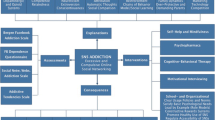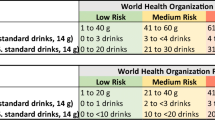Abstract
This paper presents barriers to help-seeking data as reported by users of a national gambling helpline (help-seekers, HS, N = 125) as well as data pertaining to perceived barriers to seeking help as reported by gamblers recruited from the general population (non-help-seekers, NHS, N = 104). All data were collected via a structured, multi-modal survey. When asked to identify actual or perceived barriers to seeking help, responses indicative of pride (78% of HS participants, 84% of NHS participants), shame (73% of HS participants, 84% of NHS participants) or denial (87% of NHS participants) were most frequently reported. These three factors were also most often identified as the real or perceived primary barrier to help-seeking (collectively accounting for 55% of HS, and 60% of NHS, responses to this question) and were the only barriers to be identified by more than 10% of either HS and NHS participants without prompting. It was of note, however, that participants in both groups identified multiple barriers to help-seeking (mean of 6.7 and 12.2, respectively) and that, when presented with a list of 21 possible barrier items, NHS participants endorsed 19 of the listed items significantly more often than their HS counterparts. The implications of these findings, with respect to promoting greater or earlier help-seeking activity amongst problem gamblers, are discussed.
Similar content being viewed by others
Notes
In 2006, at least 24 services located throughout New Zealand received government funding to provide treatment to problem gamblers and/or their family. By comparison, in 1991 (the year of this country’s first national problem gambling prevalence study) there were no specialist problem gambling services available in New Zealand.
106 participants were recruited for this study; however, barrier to help-seeking data were only obtained from the 59% (63/106) of participants who reported never having sought specialist treatment for a gambling problem.
If a participant had already identified one or more of the 21 listed barrier items in response to open-ended questioning, then the corresponding item(s) were excluded from the prompted list.
The options “…understand their language” and “…relate to their culture” were endorsed by 55% (32/58) and 52% (30/58) of the non-NZ European participants, respectively.
Between-group differences in these areas were reported in the companion paper (Pulford et al. in press).
References
Abbott, M. W. (2001). Problem and non-problem gamblers in New Zealand: A report on phase two of the 1999 National Prevalence Survey. Wellington: Department of Internal Affairs.
Abbott, M. W., McKenna, B. G., & Giles, L. C. (2006). Gambling and problem gambling among recently sentenced male prisoners in four New Zealand prisons. Journal of Gambling Studies, 21(4), 537–558. doi:10.1007/s10899-005-5562-6.
Abbott, M. W., & Volberg, R. (2000). Taking the pulse on gambling and problem gambling in New Zealand: A report on phase one of the 1999 national prevalence survey. Wellington: Department of Internal Affairs.
Apodaca, T. R., & Miller, W. R. (2003). A meta-analysis of the effectiveness of bibliotherapy for alcohol problems. Journal of Clinical Psychology, 59(3), 289–304. doi:10.1002/jclp.10130.
Chiarelli, N. (2006). Word-of-mouth marketing: The global rise of word of mouth. Brand Strategy, Oct 9, 42.
Cox, B., Yu, N., Afifi, T., & Ladouceur, R. (2005). A National Survey of Gambling Problems in Canada. Canadian Journal of Psychiatry, 50(4), 213–217.
Cunningham-Williams, R. M., Abdallah, A. B., Callahan, C., & Cottler, L. (2007). Problem gambling and violence among community-recruited female substance abusers. Psychology of Addictive Behaviors, 21(2), 239–243. doi:10.1037/0893-164X.21.2.239.
Cunningham, J., Hodgins, D., & Toneatto, T. (2008). Problem gamblers’ interest in self-help services. Psychiatric Services (Washington, DC), 59(6), 695–696. doi:10.1176/appi.ps.59.6.695-a.
Del Boca, F. K., & Darkes, J. (2003). The validity of self-reports of alcohol consumption: State of the science and challenges for research. Addiction, 98(Suppl. 2), 1–12. doi:10.1046/j.1359-6357.2003.00586.x.
Evans, L., & Delfabbro, P. H. (2005). Motivators for change and barriers to help-seeking in Australian problem gamblers. Journal of Gambling Studies, 21(2), 133–155. doi:10.1007/s10899-005-3029-4.
Gruenewald, P. J., & Johnson, F. W. (2006). The stability and reliability of self-reported drinking measures. Journal of Studies on Alcohol, 67(5), 738–745.
Hodgins, D., Currie, S., & el-Guebaly, N. (2001). Motivational enhancement and self-help treatments for problem gambling. Journal of Consulting and Clinical Psychology, 69(1), 50–57. doi:10.1037/0022-006X.69.1.50.
Hodgins, D., Currie, S. R., el-Guebaly, N., & Peden, N. (2004). Brief motivational treatment for problem gambling: 24 month follow-up. Psychology of Addictive Behaviors, 18(3), 293–296. doi:10.1037/0893-164X.18.3.293.
Hodgins, D., & el-Guebaly, N. (2000). Recovery from gambling problems: A comparison of resolved and active gamblers. Addiction, 95(5), 777–789. doi:10.1046/j.1360-0443.2000.95577713.x.
Hodgins, D., Shead, W., & Makarchuk, K. (2007a). Relationship satisfaction and psychological distress among concerned significant others of pathological gamblers. The Journal of Nervous and Mental Disease, 195(1), 65–71. doi:10.1097/01.nmd.0000252382.47434.a6.
Hodgins, D., Toneatto, T., Makarchuk, K., Skinner, W., & Vincent, S. (2007b). Minimal treatment approaches for concerned significant others of problem gamblers: A randomized controlled trial. Journal of Gambling Studies, 23(2), 215–230. doi:10.1007/s10899-006-9052-2.
Ladouceur, R., Boisvert, J.-M., Pepin, M., & Loranger, M. (1994). Social cost of pathological gambling. Journal of Gambling Behavior, 10(4), 399–409. doi:10.1007/BF02104905.
McMillen, J., Marshall, D., Murphy, L., Lorenzen, S., & Waugh, B. (2004). Help-seeking by problem gamblers, friends and families: A focus on gender and cultural groups. Acton, ACT, Australia: ACT Gambling and Racing Commission.
Ministry of Health. (2007). Problem Gambling Intervention Services in New Zealand: 2006 Service-user statistics. Wellington: Ministry of Health.
Morasco, B. J., vom Eigen, K. A., & Petry, N. M. (2006). Severity of gambling is associated with physical and emotional health in urban primary care patients. General Hospital Psychiatry, 28(2), 94–100. doi:10.1016/j.genhosppsych.2005.09.004.
Pallesen, S., Mitsem, M., Kvale, G., Johnsen, B.-H., & Molde, H. (2005). Outcome of psychological treatments of pathological gambling: A review and meta-analysis. Addiction, 100(10), 1412–1422. doi:10.1111/j.1360-0443.2005.01204.x.
Pallesen, S., Molde, H., Arnestad, H. M., Laberg, J. C., Skutle, A., Iverson, E., et al. (2007). Outcome of pharmacological treatments for pathological gambling: A review and meta-analysis. Journal of Clinical Psychopharmacology, 27(4), 357–364. doi:10.1097/jcp.013e3180dcc304d.
Patford, J. (2007). Linked lives: Adult children’s experiences of late onset parental gambling problems. International Journal of Mental Health and Addiction, 5(4), 367–380. doi:10.1007/s11469-007-9077-5.
Pietrzak, R. H., Morasco, B. J., Blanco, C., Grant, B. F., & Petry, N. M. (2007). Gambling level and psychiatric and medical disorders in older adults: Results from the National Epidemiologic Survey on Alcohol and Related Conditions. The American Journal of Geriatric Psychiatry, 15(4), 301–314. doi:10.1097/01.JGP.0000239353.40880.cc.
Productivity Commission. (1999). Australia’s gambling industries: Inquiry report. Melbourne: Australian Government Productivity Commission.
Pulford, J., Bellringer, M. E., Abbott, M., Clarke, D., Hodgins, D., & Williams, J. D. Reasons for seeking help for a gambling problem: The experiences of gamblers who have sought specialist assistance and the perceptions of those who have not. Journal of Gambling Studies, in press. doi:10.1007/s10899-008-9112-x.
Rockloff, M., & Schofield, G. (2004). Factor analysis of barriers to treatment for problem gambling. Journal of Gambling Studies, 20(2), 121–126. doi:10.1023/B:JOGS.0000022305.01606.da.
Slutske, W. S. (2006). Natural recovery and treatment-seeking in pathological gambling: Results of two U.S. national surveys. The American Journal of Psychiatry, 163(2), 297–302. doi:10.1176/appi.ajp.163.2.297.
Suurvali, H., Hodgins, D., Toneatto, T., & Cunningham, J. Treatment-seeking among Ontario problem gamblers: Results of a population survey. Psychiatric Services, in press.
Tavares, H., Martins, S., Zilberman, M. L., & el-Guebaly, N. (2002). Gamblers seeking treatment: Why haven’t they come earlier? Addictive Disorders & Their Treatment, 1(2), 65–69. doi:10.1097/00132576-200206000-00005.
Wardle, H., Sproston, K., Orford, J., Erens, B., Griffiths, M., Constantine, R., et al. (2007). British gambling prevalence survey 2007. London: National Centre for Social Research.
Welte, J., Barnes, G., Wieczorek, W., Tidwell, M., & Parker, J. (2001). Alcohol and gambling pathology among U.S Adults: Prevalence, demographic patterns and comorbidity. Journal of Studies on Alcohol, 62(5), 706–712.
Acknowledgements
This study was funded by the New Zealand Ministry of Health. We would like to thank Gareth Edwards for managing the questionnaire design process, TongJing (Lucy) Lu, Priscilla Clarke and Papa Nahi for assistance with data collection, and Nick Garrett for biostatistical advice.
Author information
Authors and Affiliations
Corresponding author
Rights and permissions
About this article
Cite this article
Pulford, J., Bellringer, M., Abbott, M. et al. Barriers to Help-seeking for a Gambling Problem: The Experiences of Gamblers Who Have Sought Specialist Assistance and the Perceptions of Those Who Have Not. J Gambl Stud 25, 33–48 (2009). https://doi.org/10.1007/s10899-008-9113-9
Received:
Accepted:
Published:
Issue Date:
DOI: https://doi.org/10.1007/s10899-008-9113-9




